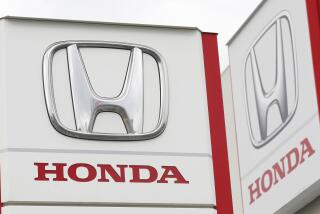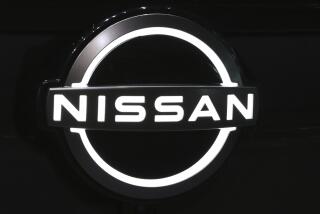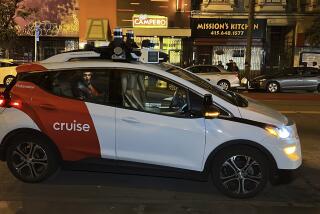Suzuki Lashes Out Against Charges Samurai Is Unsafe : Popular Vehicle Rolls Over Easily, Consumer Group Says
A barely simmering controversy over the safety of the Suzuki Samurai boiled over Sunday when the maker of the sports utility vehicle lashed out at charges that the Samurai may be dangerously unstable.
In a lengthy statement, Suzuki of America Automotive Corp. said that a consumer group’s charges that the Samurai may be unsafe “are misleading and without substance or foundation.”
The statement follows a request last week by the Center for Auto Safety, a consumer group founded by Ralph Nader in 1970, that the federal government look into claims that the Samurai turns over too easily because its center of gravity is too high.
Suzuki said it “has begun an investigation into companies and organizations making erroneous and inaccurate claims about the company and its product,” and would use every available means to stop the allegations, including legal action.
Ron Rogers, a spokesman for Suzuki, declined to elaborate on what was meant by an “investigation.”
The company added that any questions about the Samurai’s center of gravity would also apply to school buses, pickup trucks, ambulances, vans, motor homes and other multipurpose passenger vehicles. It said the Samurai has been tested thoroughly for stability and handling, and that it meets all federal regulations.
Suzuki, which has its U.S. headquarters in Brea, acted after learning that NBC News in Washington was investigating the questions about the Jeep-like Samurai.
The company’s effort to maneuver around the negative publicity follows other cases in which auto makers have been hurt after safety questions drew public attention. For example, the Audi 5000S, which had been highly regarded, suffered a plummet in sales during the past two years after allegations that models with automatic transmissions were prone to sudden acceleration.
The charges ultimately led the auto maker, a subsidiary of Volkswagen, to recall a quarter million cars. The Center for Auto Safety, no longer affiliated with Nader, was among those most critical of the Audi.
Suzuki obviously hopes to avoid a similar problem. The Samurai has been a major success story in the increasingly competitive auto market, with more than 140,000 sold since their U.S. introduction in November, 1985. More compact than the typical utility vehicle, it has found a following among young, upwardly mobile consumers. The Samurai is credited with winning sales away from subcompact cars, despite its four-wheel drive and other features associated with utility vehicles.
Thomas F. O’Grady, an analyst with Integrated Automotive Resources in Wayne, Pa., said he was aware of no evidence that the Samurai had a safety defect, but added that some drivers might be tempted to use it in especially difficult, dangerous terrain. “I don’t think that Suzuki or anybody is recommending that drivers go up sharp slopes and bounce over logs.” He asked: “When does use end and abuse begin?”
Last week, the nonprofit consumer group asked the National Highway Traffic Safety Administration to investigate the Samurai in light of 11 reports that the vehicle had turned over, causing three deaths and eight injuries.
“We’re convinced that we have only the tip of the iceberg of these roll-over incidents,” Clarence M. Ditlow, director of the center, said in an interview Sunday. Ditlow, an attorney and engineer, continued: “We’re not asking that they be taken off the road today. We’re just asking for an investigation to find out how bad these vehicles really are.”
O’Grady said adverse publicity about the Samurai could hurt Suzuki in two ways: by encouraging lawsuits and by cutting into sales. “I’m certain they (the consumer group) are trying to do good, and that they are going after things they think are very important to society,” the analyst said. “I just hope they’re very careful.”






